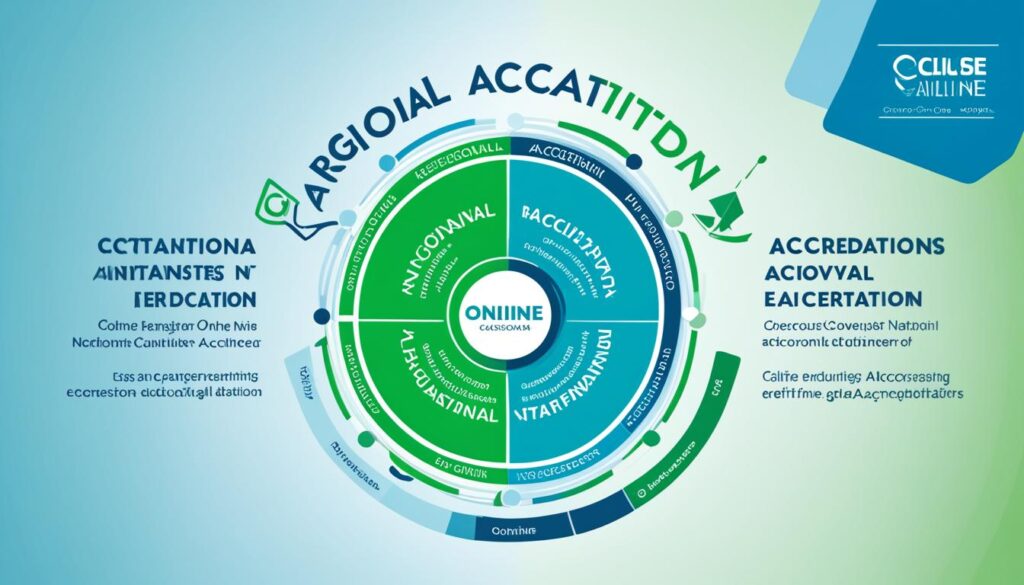Did you know that over 6 million students in the United States are currently enrolled in at least one online course? As the demand for flexible and accessible education continues to grow, it’s crucial to ensure that the online programs you consider are accredited. Accreditation signifies that an online program has gone through a rigorous evaluation and meets high educational standards.
According to the U.S. Department of Education, “The goal of accreditation is to ensure that institutions of higher education meet acceptable levels of quality.” This external validation from accrediting bodies enhances the credibility and reputation of an online institution, making it a critical factor in your decision-making process when choosing an online degree program.
Key Takeaways
- Accreditation is a voluntary process that ensures online programs meet high educational standards.
- Accredited online programs are recognized for their quality and credibility by employers and educational institutions.
- Enrolling in an accredited online program allows you to be eligible for financial aid and have your credits easily transferred.
- Accreditation is essential for professional licensing and certifications in many fields.
- Thoroughly research the accreditation status of any online program before enrolling to ensure you are receiving a quality education.
Understanding Accreditation in Online Education
As the online education landscape continues to expand, the importance of accreditation has become increasingly paramount. Accreditation is a voluntary process that evaluates educational institutions, both traditional and online, to ensure they meet rigorous quality standards set by independent accrediting bodies. This process encompasses a comprehensive review of various aspects of an institution, including its curriculum, faculty qualifications, student services, and infrastructure.
What is Accreditation?
Accreditation is a formal recognition that an educational institution or program has met or exceeded the standards set by an accrediting body. This external validation enhances the credibility and reputation of the institution, assuring students, employers, and the broader community that the education provided is of high quality. The U.S. Department of Education defines accreditation as “a process that ensures the quality of the institution and its programs.”
Accreditation Process and Standards
The accreditation process involves a rigorous evaluation by an independent accrediting body, which examines the institution’s educational programs, faculty qualifications, student services, and overall operations. Accrediting bodies establish specific standards that institutions must meet, covering areas such as curriculum, student learning outcomes, and institutional resources. This comprehensive assessment ensures that accredited institutions maintain a high level of educational quality and integrity.
Regional and National Accrediting Bodies
In the United States, there are two primary types of accrediting bodies: regional accreditors and national accreditors. Regional accrediting bodies focus on institutions within specific geographic regions, while national accreditors evaluate institutions across the country. These accrediting bodies are recognized by the U.S. Department of Education and the Council for Higher Education Accreditation (CHEA) to ensure the quality and integrity of educational programs.

Online education accreditation importance
Accreditation serves as a crucial quality assurance mechanism for online education, ensuring that the institution and its programs meet or exceed industry standards for quality assurance online education. When you enroll in an accredited online program, you can be confident that you are receiving a high-quality education that carries accreditation credibility.
Quality Assurance and Credibility
Accredited online programs have undergone rigorous evaluation by independent accrediting bodies, verifying that they adhere to stringent standards in areas such as curriculum, faculty qualifications, student services, and overall educational infrastructure. This external validation enhances the accreditation credibility of the institution, instilling trust in both students and employers.
Transferability of Credits
Enrolling in an accredited online program ensures that your earned credits will be credit transfer eligible, allowing you to potentially transfer them to another institution or apply them towards a higher degree. This flexibility is crucial for students who may wish to continue their education or change their academic path.
Eligibility for Financial Aid
Attending an accredited online institution is a key requirement for financial aid eligibility. Students enrolled in accredited programs are eligible to receive federal financial aid, such as grants, loans, and scholarships, which can significantly alleviate the financial burden of pursuing an online education.
Professional Licensing and Certifications
Many professional fields, such as healthcare, education, and business, have specific professional licensing requirements that can only be met by completing an accredited program. Choosing an accredited online program ensures that your degree or certification will be recognized by licensing boards and professional organizations, enhancing your career opportunities.

Choosing an Accredited Online Program
To ensure you are enrolling in an accredited online program, it is essential to thoroughly research the institution’s accreditation status. The first step is to check the institution’s website, which should prominently display information about their accreditation and the accrediting body.
Researching Accreditation Status
When researching accredited online programs, it is crucial to verify the institution’s accreditation status. You can start by visiting the websites of recognized accrediting organizations, such as the U.S. Department of Education or the Council for Higher Education Accreditation (CHEA), to search for the program or institution you are considering. These databases can provide you with a comprehensive list of accredited colleges and universities, including their specific accreditation details.
Checking Institutional Websites and Databases
In addition to consulting accreditation databases, you should also thoroughly review the website of the online institution you are interested in. Look for clear and prominent information about their accreditation status, including the name of the accrediting body and the specific programs or the institution as a whole that are accredited. This information is typically found on the institution’s “About Us” or “Accreditation” pages.
Verifying Accreditation with the Institution
If you are still unsure about the accreditation status of an online program, you can directly contact the institution and request more information. Ask them to provide you with the specific details of their accreditation, including the name of the accrediting body, the date of their most recent accreditation, and the scope of the accreditation. This extra step can give you the peace of mind that you are enrolling in a program that has undergone the necessary quality assurance measures.

Conclusion
Accreditation is the cornerstone of quality and credibility in the realm of online education. By entrusting your academic pursuits to an accredited online program, you can be assured that you are receiving a legitimate and valuable education that will be recognized by employers and eligible for financial aid opportunities.
The rigorous evaluation process undertaken by accrediting bodies ensures that these programs uphold the highest standards of academic excellence, from the curriculum and faculty qualifications to the student services and infrastructure. This external validation enhances the reputation and credibility of your online degree, making it a valuable asset in the competitive job market.
As you embark on your educational journey, prioritize enrolling in an accredited online program. This decision will not only safeguard the quality of your learning experience but also open doors to countless possibilities, from seamless credit transfers to eligibility for professional licensing and certifications. Embrace the power of accreditation and unlock the full potential of your online education.
Source Links
- https://www.tuw.edu/school-news/importance-of-accredited-online-degree-programs/
- https://ojdla.com/articles/quality-standards-and-accreditation-of-distance-education-programs-in-a-pandemic
- https://www.linkedin.com/pulse/importance-accreditation-online-education


